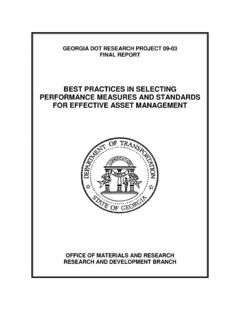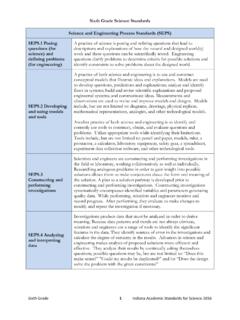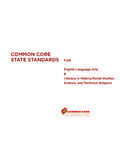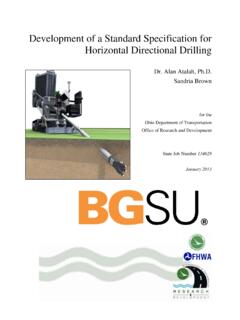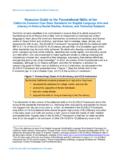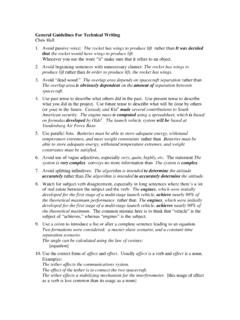Transcription of PROJECT AUDIT METHODOLOGY - projektmanazer.cz
1 1 "Your career as a PROJECT manager begins here!" PROJECT AUDIT METHODOLOGY 2 "Your career as a PROJECT manager begins here!" Content Introduction .. 3 1. Definition of the PROJECT AUDIT .. 3 2. Objectives of the PROJECT AUDIT .. 3 3. Benefit of the AUDIT for METHODOLOGY users .. 5 4. AUDIT 5 5. Users .. 6 6. Principles of the PROJECT AUDIT .. 7 7. Subject of the PROJECT AUDIT .. 8 8. Process of the PROJECT AUDIT .. 8 9. Used methods .. 9 10. AUDIT report content .. 10 11. Basic AUDIT structure .. 11 12. AUDIT METHODOLOGY according to individual phases and areas .. 14 13. Glossary .. 21 14. Literature .. 28 15. List of Annexes .. 28 Annexe No. 1 PROJECT creation Annexe No. 2 PROJECT proposal Annexe No. 3 PROJECT planning Annexe No. 4 PROJECT realisation Annexe No. 5 PROJECT completion Annexe No. 6 Overall PROJECT evaluation Annexe No. 7 Self-assessment questionnaire behavioural competences Annexe No.
2 8 Sample AUDIT report 3 "Your career as a PROJECT manager begins here!" Introduction The National Institute for Further Education realised the " PROJECT Manager 250+" PROJECT . The PROJECT focused on the education of managers in the education system, who hold the position of PROJECT manager and need professional and complex support. The PROJECT was based on the competence profile of a PROJECT manager in education. The competence profile can be used to create an individual personal competence profile and thus navigate personal development in the right direction. The PROJECT AUDIT METHODOLOGY was prepared within this PROJECT in cooperation with the Centre for European Projecting, The PROJECT AUDIT METHODOLOGY was tested on the PROJECT target group. The aim of this METHODOLOGY is to provide PROJECT managers in education with an effective tool for the AUDIT procedure focused on the material aspect of PROJECT management.
3 The METHODOLOGY can be used to perform both internal and external PROJECT audits. In case of an internal AUDIT , the statutory body or the PROJECT managers must not be the leaders of the auditory team and, if possible, even members of the auditory team. 1. Definition of the PROJECT AUDIT The PROJECT AUDIT is the process of verification of the extent to which the PROJECT realisation complied with the rules and principles of PROJECT management for the concrete PROJECT . The AUDIT METHODOLOGY is based on the following norms and standards governing the PROJECT management: Czech technical standard SN ISO 10006, ed. 2 Quality management systems Guidelines for quality management in projects, Czech standards Institute, Prague 2004, p. 48. National standard for competences in PROJECT management, version , Brno: Brno University of Technology in cooperation with SP , o. s., 2010, p. 314, ISBN 978-80-214-4058-6. 2. Objectives of the PROJECT AUDIT The aim of this methodological guide is to provide auditors with a material tool for performing an AUDIT of the selected PROJECT , which will help them verify if and to what 4 "Your career as a PROJECT manager begins here!
4 " extent the PROJECT realisation complied with the rules and principles of PROJECT management The METHODOLOGY of PROJECT management is written in the form of a practical manual for users (auditors), which will guide them step by step through the AUDIT process and its principles, and it will provide tools for performing an AUDIT , including a sample AUDIT report. The PROJECT management AUDIT verifies whether the basic rules of PROJECT management were adhered to and whether the PROJECT was managed correctly. The purpose of the methodological guide is to provide an overview of the main tools, basic terms and general principles, methods and procedures recommended based on the experience contained in internationally accepted standards . The main goal of an AUDIT is to inspect and evaluate the current state of PROJECT realisation, find out to what extent it complied with defined criteria for PROJECT success and identify opportunities for improving the PROJECT realisation and management.
5 This inspection can be performed after the PROJECT completion or after the end of one PROJECT realisation stage, or it can be performed during the PROJECT realisation. Specific AUDIT goals: Assess the quality of PROJECT management Assess the correspondence of reached PROJECT outputs with planned outputs and PROJECT goals Assess the purposefulness and quality of PROJECT documentation Assess the efficiency of used PROJECT management tools The following is not the aim of this AUDIT METHODOLOGY : Assess the compliance to legal regulations, including regulations of grant authorities PROJECT financial AUDIT (correctness, economy and efficiency of invested resources) Compare the quality of PROJECT management of individual projects audited in accordance with the same METHODOLOGY 5 "Your career as a PROJECT manager begins here!" 3. Benefit of the AUDIT for METHODOLOGY users Verification of the correctness and extent of PROJECT management principles application o Verification of the correctness of the realisation procedure for individual PROJECT phases o Clear summary of the state of management of individual PROJECT phases o Obtaining information about performed / non performed activities in individual PROJECT phases o Obtaining information about the created PROJECT documentation o Identification of shortages in PROJECT management o Proposed measures for improvement Verification of PROJECT goal fulfillment o Overall assessment of whether the aim was met o Verification of whether PROJECT results were accepted and whether the PROJECT was successful 4.
6 AUDIT approach The procedural approach was used when creating the AUDIT METHODOLOGY . An AUDIT will be performed for individual PROJECT phases, divided into the following stages: PROJECT creation PROJECT proposal PROJECT planning PROJECT realisation PROJECT completion (delivery, evaluation, conclusion) Finally, the overall PROJECT management is evaluated for completed projects. High-quality PROJECT management also presupposes the knowledge and application of behavioural skills, which are also evaluated within this METHODOLOGY . Overall evaluation of the PROJECT management quality Behavioural skills 6 "Your career as a PROJECT manager begins here!" The PROJECT division into individual phases is only a recommendation. Projects can be divided into more or less phases, upon the discretion of the PROJECT implementer. According to generally accepted principles of PROJECT management, a PROJECT should be divided into at least 4 phases: Initiation (creation), Definition (this METHODOLOGY divides this phase into PROJECT proposal and PROJECT planning), Implementation ( PROJECT realisation), Completion ( PROJECT completion).
7 At the end of each phase a decision is made whether to move the PROJECT into the next phase. AUDIT METHODOLOGY provides the tool for performing an AUDIT of individual PROJECT phases and of the overall PROJECT realisation. 5. Users a) Users of the AUDIT METHODOLOGY Auditors methodological guide for performing an AUDIT of the selected PROJECT or its part; tool for overall evaluation of PROJECT management PROJECT managers in education methodological guide for continuous verification of PROJECT management quality in individual phases (tools are used as guidance for ensuring all important steps in the realisation of individual/selected PROJECT stages and performing an immediate correction of any discovered shortage/error. This METHODOLOGY brings users an independent overview of the current PROJECT state and thus increases the efficiency of the whole PROJECT . We recommend the following implementations: - the auditor uses the METHODOLOGY for evaluation, as an evaluation tool; - the PROJECT manager uses it for PROJECT quality management, as a management tool.
8 B) AUDIT output users PROJECT managers feedback School management and education institutions management School founders PROJECT sponsors (providing financial resources for PROJECT realisation) Based on a school management decision, the AUDIT outputs can be used for further development of the organisation (school), or to process conceptual and evaluation 7 "Your career as a PROJECT manager begins here!" materials. The school/organisation management always decides on providing the PROJECT AUDIT outputs to other subjects. 6. Principles of the PROJECT AUDIT The AUDIT is performed in accordance with the created METHODOLOGY using tools created within the METHODOLOGY (check-list, questionnaires). All activities of the PROJECT management will be evaluated in accordance with these basic principles: a) Principle of efficiency using processes in order to reach the predefined and approved extent, quality and planned outputs. b) Principle of purposefulness using processes ensuring the optimum extent of goal achievement.
9 C) Principle of effect measuring the extent to which the goal and PROJECT outputs were achieved; relationship between factual and planned state. d) Principle of openness open approach towards concrete cases, discussing them, providing information about the success of a solution. e) Principle of cooperation if necessary, involve competent institutions into the solution; offer cooperation and share experience with others. f) Principle of professionalism be a competent person, increase the level of competence. g) Principle of complexity ensure the correspondence and relationship between the PROJECT and other school activities. h) Principle of objectivity the PROJECT manager must not assume that shortages in the PROJECT management are their fault and that they are therefore a bad PROJECT manager. PROJECT management must be viewed within the wider environment. i) Principle of practical experience it is important to not only know the PROJECT management theory, but also to be able to practically apply the theoretical knowledge in the PROJECT management.
10 J) Principle of ethics and safety all information, results and other facts revealed during the AUDIT are to be considered confidential. Third parties may have access to this information in the extent approved by the PROJECT manager. It is necessary to proceed sensitively and emphatically during the AUDIT . 8 "Your career as a PROJECT manager begins here!" k) Principle of reproducibility the AUDIT must be performed in such a way as to be able to ensure a full comparative compatibility of AUDIT results if realised repeatedly with regards to the content and form. 7. Subject of the PROJECT AUDIT The AUDIT subject consists of the selected PROJECT which is, or has been, managed in the given organisation. The AUDIT subject can include the whole PROJECT or just one completed phase (initiation, proposal, planning, realisation, completion). The AUDIT will also evaluate the compliance with PROJECT management principles in individual PROJECT phases according to audited areas stated in Chapter 11.

